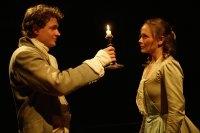The Marrying of Ann Leete
The Orange Tree is renowned for its staunch defence of many neglected plays and has a particularly strong association with the work of Harley Granville-Barker, the influential twentieth century playwright. Their revival of this early work written in 1899 but set in the 1790's is intriguing and though much of the language is dated, its theme of a girl trying to preserve her individuality retains much significance today.
Carnaby Leete is a disgraced politician keen for his unworldly young daughter Ann to form an advantageous alliance with the aristocratic Lord John Carp in order to save the family's reputation. Smitten by her suitor's insouciance yet intensely aware of her vulnerable position Ann refuses to be a political pawn, all too aware of her sister's unhappy marriage, and determined to avoid her fate. Growing up in a household where political intrigue is the order of the day Ann feels society as a whole is too keen on artificial progress: 'We've all been in too great a hurry to get civilised,' deliberately choosing a rustic life that rejects everything epitomised by her comfortable upbringing.
There are some interesting ideas mooted here but the final few scenes over-stretch credibility. A strong cast maintain interest throughout though with much humour arising from the dramatic volte face that a change in circumstance effects- Vilma Hollingbery extracting full comic potential from her small role as the ancient Lady Leete.
Tim Meacock's period costumes are sumptuous and director Sam Walters certainly elicits good measure from Granville-Barker's unusual drama.
Picture: Jack Sandle as Abud and Octavia Walters as Ann
Originally published on
